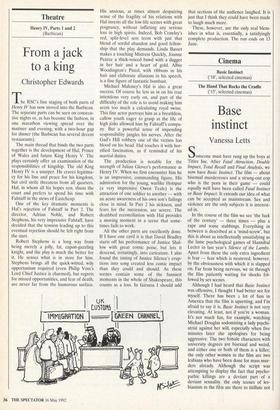Theatre
Henry IV, Parts 1 and 2 (Barbican)
From a jack to a king
Christopher Edwards
The RSC's fine staging of both parts of lietuy IV has now moved into the Barbican. The separate parts can be seen on consecu- tive nights or, as has become the fashion, in one marathon viewing spread over the matinee and evening, with a two-hour gap for dinner (the Barbican has several decent restaurants).
The main thread that binds the two parts together is the development of Hal, Prince of Wales and future King Henry V. The plays certainly offer an examination of the responsibilities of kingship. The old King Henry IV is a usurper. He craves legitima- cy for his line and peace for his kingdom, but civil strife threatens from all quarters. Hal, in whom all his hopes rest, shuns the court and prefers to spend his time with Falstaff in the stews of Eastcheap.
One of the key dramatic moments is Hal's rejection of Falstaff in Part 2. The director, Adrian Noble, and Robert Stephens, his very impressive Falstaff, have • decided that the tension leading up to this eventual rejection should be felt right from the start.
Robert Stephens is a long way from being merely a jolly, fat, capon-guzzling knight, and the play is much the better for it. He senses what is in store for him. Stephens brings all the quick-witted, wily opportunism required (even Philip Voss's Lord Chief Justice is charmed), but regrets for missed opportunities, and fear of death, are never far from the humorous surface.
His anxious, at times almost despairing sense of the fragility of his relations with Hal invests all the low-life scenes with great poignancy, without inflicting any serious loss in high spirits. Indeed, Bob Crawley's red, split-level sets teem with just that blend of sordid abandon and good fellow- ship that the play demands. Linda Basset makes a touching Mistress Quickly, Joanne Pearce a thick-voiced bawd with a dagger in her hair and a heart of gold. Albie Woodington's Pistol, with ribbons in his hair and elaborate allusions in his speech, is a fine figure of fantastic bombast.
Michael Maloney's Hal is also a great success. Of course he lets us in on his true intentions very early on, and part of the difficulty of the role is to avoid making him seem too much a calculating royal swine. This fine actor portrays him as a breathless, callow youth eager to grasp at the life of high jinks allowed him by Falstaff s compa- ny. But a powerful sense of impending responsibility jangles his nerves. After the Gad's Hill robbery one of the victims has blood on his head. Hal touches it with hor- rified fascination, as if reminded of his martial duties.
The production is notable for the strength of Julian Glover's performance as Henry IV. When we first encounter him he is an impressive, commanding figure. His admiration for the young, warlike Hotspur (a very impressive Owen Teale) is the attraction of one soldier to another — with an acute awareness of his own son's failings close in mind. In Part 2 his sickness, and fears for the succession, are severe. The deathbed reconciliation with Hal provides a moving moment in a scene that some- times fails to work.
All the other parts are excellently done. If I have one cavil it is that David Bradley starts off his performance of Justice Shal- low with great comic poise, but lets it descend, irritatingly, into caricature. I also found the timing of Justice Silence's erup- tions into song created less comic impact than they could and should. As these scenes contain some of the funniest moments in the whole of Shakespeare, this counts as a loss. In fairness I should add
that sections of the audience laughed. It is just that I think they could have been made to laugh much more.
These, however, are the only real blem- ishes in what is, essentially, a satisfyingly complete production. The run ends on 13 June.


















































 Previous page
Previous page